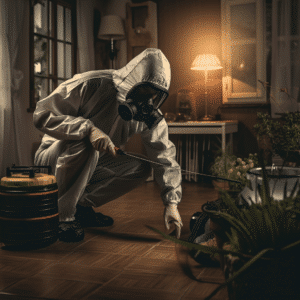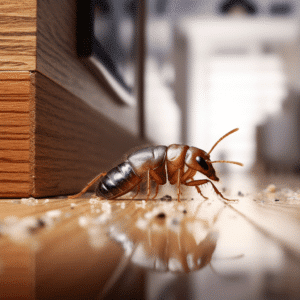Pest Prevention Tips can be a real nuisance in our homes. To stop them entering, we need to take proactive action both inside and outside our house.
An effective way to keep pests at bay is by sealing any openings on the exterior – walls, windows and doors. Installing door sweeps and screens on windows can help reinforce the barrier.
Maintaining cleanliness inside is essential. Clear away food crumbs, spills and garbage regularly to avoid attracting ants and cockroaches. Food should also be stored in airtight containers to prevent pantry pests like moths and weevils.
Remove standing water from our surroundings to stop mosquitoes breeding near us. Empty containers like buckets and flowerpots, plus keep gutters clean.
An example of successful pest prevention is a young couple who lived in a suburban area. They had mice in winter. It inspected their house, finding gaps along the foundation and around pipes. They sealed them with caulk. They placed traps near where the mice had been seen. Their hard work was rewarded – their home stayed mouse-free for years.
Table of Contents
Understanding Common Pests

Pests can be a real headache, bringing both damage and health risks. To not let them in, it is a must to understand their habits and behaviors.
Common pests, such as ants, cockroaches, rodents, and spiders, are usually drawn to food sources in houses. They can creep in through small cracks and crevices or stick to clothes or belongings. Knowing their preferred places and entry points can help you in being proactive.
For instance, ants search for sugary substances and crumbs. To avoid them, keep your kitchen neat and tidy. Wipe up spills quickly and store food in sealed containers. Also, seal all gaps or openings in windows and doors.
Cockroaches live in warm and humid environments, making kitchens an ideal spot for them. Clean your kitchen by regularly disposing of trash, washing dishes quickly, and sealing cracks in cabinets or walls. Additionally, repair any dripping pipes or faucets as cockroaches are fascinated by water sources.
Rodents like mice and rats look for shelter in homes during colder months. Seal any small openings or gaps around your home’s foundation to block their entry. Furthermore, make sure that your garbage bins are sealed to avoid attracting them with food waste.
Spiders are mainly attracted to dark corners and messy spaces where they can weave their webs undisturbed. Often declutter storage areas like basements or attics to stop them from entering. Vacuuming on a regular basis can also help in removing spider webs.
By understanding the habits of common pests like ants, cockroaches, rodents, and spiders you can take preventive steps to keep them away from your home. Keeping the environment clean by frequent cleaning and sealing any potential access points will aid in not welcoming unwanted visitors.
Identifying Entry Points
Pest Prevention Tips can enter your home through various entry points. To stop them, it is important to recognize these access points. So, you can take the necessary measures to block them off. Here are some examples:
- Cracks and gaps in walls and foundations – Seal with caulk or weatherstripping.
- Gaps around windows and doors – Fit door sweeps and weatherproofing strips.
- Openings around pipes and lines – Seal with expandable foam or wire mesh.
- Vents and chimneys – Cover with mesh screens or caps.
- Damaged roof tiles or shingles – Repair right away.
Inspect your home for other areas that pests can use to get in. Prevention is key to pest control. By identifying and blocking entry points quickly, you can reduce the chance of pests entering your living space. Don’t wait until it’s too late – take action now to keep your home safe!
Preventive Measures
- Seal cracks and crevices in walls, floors and windows, to stop pests.
- Remove food and clutter that can attract them.
- Check the roof and gutters for potential entry points.
- Eliminate standing water to stop mosquitoes.
- Trim vegetation in the garden to deter pests.
- Preventing pests is better than dealing with them.
- Install screens on windows and doors for extra protection.
Eliminating Attractants
- Store food properly. Keep it in containers that pests can’t get into. This’ll stop bugs and rodents hunting for food.
- Clean often. Remove crumbs or spills that might attract pests. Don’t forget hard-to-reach spots like behind appliances or underneath furniture.
- Seal entry points. Look for openings or cracks that pests could use. Seal them with caulk or other materials to block their access.
- Manage moisture levels. Pests often go for areas with high humidity or standing water. Check for leaks, fix any moisture issues quickly, and properly ventilate damp places.
- Also, proper waste management is key. Put rubbish in sealed bins away from your home’s entrance.
Let me tell you a true story. Sarah was tired of pest infestations, even though she kept her house clean. She asked for help and learnt that she’d been leaving pet food out overnight. Pest Prevention Tips was a big attractant for pests. Sarah changed her habit and put other preventative measures in place. She managed to get rid of the attractants luring pests into her home.
So remember, get rid of things that attract pests like storing food wrong, not cleaning, unsealed entry points, too much moisture, and poor waste management. This’ll make a pest-free environment.
Natural Pest Repellents
- Peppermint oil: Mix a few drops with water and spray around entry points to keep ants, spiders, and mice away.
- Vinegar: Dilute it with water and wipe down areas prone to infestation. Fruit flies, cockroaches, and ants won’t stand a chance!
- Citrus peels: Place strategically around the house and watch spiders, mosquitoes, and flies flee.
- Cedarwood: Use sachets or sprinkle cedar oil around window sills and baseboards. Moths, ants, and fleas won’t bother you anymore!
- Baking soda: Sprinkle in crevices and corners. Silverfish and cockroaches will stay far away.
- Lavender: Mosquitoes, moths, and flies don’t like its calming properties. Place sachets or use lavender essential oil mixed with water as a spray.
Additionally:
- Clean up food scraps and spills.
- Seal openings/gaps in walls, doors, windows.
Pro Tip: Try a combination of repellents for better results than using one method only. Find what works best for your pest problems.
Hiring Professional Pest Control

Pest Prevention Tips is essential to keeping pests out of your home. Employing a professional pest control service gives you the best solutions and ease of mind.
Benefits of Professional Pest Control:
- Knowledge and Experience: Pest control professionals know how to detect, treat, and prevent pests. They are informed of the newest techniques and products for effective pest management.
- Tailored Services: Professional pest control companies customize their services to fit your needs. They inspect the property to assess the infestation and create a custom treatment plan.
- Long-term Protection: DIY methods may only offer temporary relief, while professional pest control provides long-term solutions. They not only remove existing pests but also put preventive measures in place to reduce future infestations.
Pest Prevention Tips, pros make sure safety protocols are followed during the treatment process, safeguarding you and your family from hazardous chemicals.
A Bit of History: In ancient times, folks depended on natural remedies like herbs and aromas to drive pests away from their homes. As cities grew, more advanced pest control methods were needed. Nowadays, with technological advances, professional pest control is an essential part of maintaining a pest-free home.
Conclusion
To stop pests from entering, follow these steps:
- Inspect and seal cracks or openings in walls, windows, and doors.
- Keep surroundings clean and free of clutter.
- Store food in sealed containers and take out the trash.
- Sanitation is key – clean up spills and crumbs fast!
- Use natural pest deterrents like peppermint oil or vinegar spray – these are safe for humans and pets.
- Regularly seek professional pest control services to identify any signs of infestation early.
- Take action now to protect your home and family – prevention is the best way to avoid an infestation!
Frequently Asked Questions
Q: What are the common pests that can enter my home?
A: Common pests that can enter your home include ants, cockroaches, rodents, spiders, termites, and flies.
Q: How can I prevent ants from entering my home?
A: To prevent ants, keep your house clean and free of food debris, seal cracks and openings, store food in airtight containers, and use ant baits or barriers.
Q: What steps can I take to keep cockroaches out of my house?
A: To keep cockroaches away, eliminate food and water sources, seal cracks and crevices, repair any leakages, keep garbage tightly sealed, and use cockroach baits or traps.
Q: How do I prevent rodents from entering my home?
A: Prevent rodents by sealing entry points, keeping your home clean and tidy, storing food in rodent-proof containers, setting up traps or using natural deterrents like peppermint oil.
Q: What measures should I take to keep spiders away?
A: To keep spiders at bay, declutter your home, vacuum regularly, seal cracks, install screens on windows and doors, use spider repellents, and remove their prey like insects or other pests.
Q: What can I do to prevent termite infestation?
A: To prevent termite infestation, eliminate wood-to-soil contact, repair any moisture issues, maintain proper ventilation, treat wooden structures with termite-resistant products, and schedule regular inspections.
